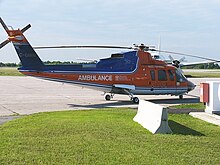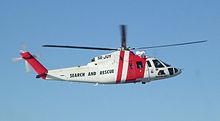Sikorsky S-76: Difference between revisions
m →Development: image caption: wikilink "air ambulance" |
|||
| Line 47: | Line 47: | ||
*'''S-76A++''' : S-76 helicopters fitted with two Turbomeca Arriel 1S1 turboshaft engines. |
*'''S-76A++''' : S-76 helicopters fitted with two Turbomeca Arriel 1S1 turboshaft engines. |
||
*'''S-76A Mk II''' : Improved all-weather transport version, fitted with a more powerful engines, and other detail improvements. |
*'''S-76A Mk II''' : Improved all-weather transport version, fitted with a more powerful engines, and other detail improvements. |
||
*'''S-76B''' : Powered by two [[Pratt & Whitney Canada PT6]]B36A turboshaft engines. 101 built. |
*'''S-76B''' : Powered by two [[Pratt & Whitney Canada PT6]]B36A/B turboshaft engines. 101 built. |
||
*'''S-76C''' : Powered by two 539-kW (981-shp) Turboméca Arriel 1S1 turboshaft engines. 43 manufactured. |
*'''S-76C''' : Powered by two 539-kW (981-shp) Turboméca Arriel 1S1 turboshaft engines. 43 manufactured. |
||
*'''S-76C+''' : Uprated version, fitted with improved Arriel 2S1 turboshafts with FADEC. 35 manufactured. |
*'''S-76C+''' : Uprated version, fitted with improved Arriel 2S1 turboshafts with FADEC. 35 manufactured. |
||
Revision as of 20:01, 21 April 2009
| S-76 Spirit | |
|---|---|

| |
| A New Jersey State Police helicopter flying low | |
| Role | SAR/utility helicopter |
| Manufacturer | Sikorsky Aircraft Corporation |
| First flight | March 13 1977 |
| Primary user | CHC Helicopter Corporation |
| Variants | Sikorsky S-75 |
The Sikorsky S-76 Spirit is an American multi-purpose medium-size commercial helicopter. The S-76 is powered by two turboshafts which combine to drive the main and tail rotors, each of four blades. The S-76 landing gear is retractable.
Development

The development of the machine began with Sikorsky in the middle of the 1970s. Target group were companies, which looked for a medium business helicopter, as well as the oil drilling industry. Sikorsky's development experiences from the UH-60 Black Hawk served as the basis for the S-74 (later renamed S-76 Spirit in honor of the US Bicentennial). which was able to transport 2 pilots and 12 passengers, received first two Allison 250 C30 turboshafts with 478 kW each. The prototype completed its first flight on 13 March 1977.[1]
The S-76A was the first production variant. The type achieved 1982 several class records within the range climbing achievement, maximum speed and ceiling. Several airlines operate the S-76A on scheduled services including Helijet Airways of Vancouver, British Columbia, Canada.
After the S-76A, the S-76 Mk II (1982), the S-76B in the year 1987 with a top speed of 155 knots at sea level. Over 500 S-76s had been delivered by early 2001.[2]
Until December 2005 the S-76C+ was in production. It is equipped with Turboméca Arriel 2S1 engines with FADEC and an EFIS suite from Honeywell.[3] The tail rotor could be made quieter by modification. For comfort, increased active noise and vibration dampers are used. The main rotor is manufactured from composite materials.
Since 3 January 2006 the certified S-76 C++ has the more efficient Turboméca Arriel 2S2, an intake air filter, an improved and quieter transmission as well as changes of detail at the interior equipment and electronics. There were 92 orders for this model as of January 2006.
In 2009 the S-76D is currently under development and will be powered by 1,050 shp PW210S engines driving composite material rotors and will incorporate active vibration control. A prototype made its first flight on 7 February 2009; type certification is expected in 2010 and deliveries are anticipated later that year. Three prototypes will be used in the certification program. One aircraft will be used to obtain certification of an optional electric rotor ice-protection system. Performance will be substantially improved with the added power, but initial certification will retain the same gross weight (11,700 pounds) and maximum cruise speed (155 knots).[4] The rotor rpm will be self adjusting in flight. The higher rpm setting for takeoff and landing and a lower rpm setting for cruise for improved range.
Variants
Civil

- S-76A : Original production version, powered by two 485-kW (650-shp) Rolls-Royce (Allison) 250-C30 turboshaft engines. Large number modified to S-76A+. 284 manufactured.
- S-76A Utility : Utility transport version, equipped with sliding doors and a strengthened floor.
- S-76A+ : Unsold S-76s were fitted with two Turbomeca Arriel 1S turboshaft engines. 17 manufactured.
- S-76A++ : S-76 helicopters fitted with two Turbomeca Arriel 1S1 turboshaft engines.
- S-76A Mk II : Improved all-weather transport version, fitted with a more powerful engines, and other detail improvements.
- S-76B : Powered by two Pratt & Whitney Canada PT6B36A/B turboshaft engines. 101 built.
- S-76C : Powered by two 539-kW (981-shp) Turboméca Arriel 1S1 turboshaft engines. 43 manufactured.
- S-76C+ : Uprated version, fitted with improved Arriel 2S1 turboshafts with FADEC. 35 manufactured.
- S-76C++ : Turboméca Arriel 2S2
- S-76D : Proposed version.
Military
- AUH-76 : Armed utility transport version, developed from the S-76 Mk. II.
- H-76B : Military version of the S-76B.
- H-76N : Planned naval version of 1984, not implemented.
Experimental derivatives


- Sikorsky S-75
- The Advanced Composite Airframe Program (ACAP) was an all-composite Sikorsky early LHX proof of concept aircraft.
- Sikorsky S-76 SHADOW
- Boeing-Sikorsky MANPRINT study. The original concept of the LHX program was to produce a one-man helicopter that could do more than a two-man aircraft. The Sikorsky (S-76) Helicopter Advance Demonstrator of Operators Workload (SHADOW) had a single-pilot advanced cockpit grafted to its nose. The purpose was to study the MANPRINT or human engineering interface between the pilot and the cockpit controls and displays. The cockpit was the prototype of a single-pilot cockpit designed for use on the prototype RAH-66 Comanche armed reconnaissance helicopter. The cockpit was designed so sensors would feed data to the pilot through helmet mounted displays. The MANPRINT study determined that single-pilot operation of the Comanche was unsafe, and would result in pilot overload. As result of this study, the Comanche was designed to be operated by a crew of two.[5]
Operators
The S-76 is in use around the world with airlines, corporations, hospital, government operators and, notably, the British Royal Family. The world's largest civilian fleet (79) of Sikorsky S-76 helicopters is operated by CHC Helicopter Corporation.
Civil

- Esso Australia in Victoria, Australia operates 5 aircraft in Bass Strait oil fields
- Jayrow Helicopters in Victoria, Australia operates 3 aircraft off the Victorian coast
- Lider Taxi Aereo, serving the Brazil offshore petroleum industry
- Brazilian Helicopter Services (BHS), serving the Brazil offshore petroleum industry
- CHC Helicopter Corporation
- Emergency Health Services in Nova Scotia
- HeliJet — scheduled service in Vancouver and Victoria, British Columbia
- Ornge (Ontario Air Ambulance) — aircraft located in Kenora, Thunder Bay, Moosonee, Sudbury, Toronto(2), London and Ottawa.
- Government Flying Service - retired 2002
- HeliExpress — scheduled service between Hong Kong, Macau and Shenzhen, China
- Part of the presidential fleet, 1 aircraft
- Xunta de Galicia operates two S-76C+ for Search and Rescue
- Serbian Ministry of Internal Affairs operetes one VIP
- Norrlandsflyg — operates nine helicopters in Sweden for Search and Rescue and air ambulance.
- Bristow In UK and Global, operating 53 S76A, A+, A++, C+ and C++
- One aircraft operated by The Queen's Flight. Maintained by PremiAir at Blackbushe Airport

- Air Logistics a Bristow Company, serving the Gulf of Mexico offshore petroleum industry
- Boston MedFlight Critical Care Transport Helicopter
- ERA Helicopters, serving the Gulf of Mexico offshore petroleum industry
- Geisinger Medical Center Life Flight
- Metro Life Flight Serving Northeast Ohio
- New Jersey State Police
- Palm Beach County Fire-Rescue and Health Care District of Palm Beach County, operating two S-76C+ designated "Trauma Hawks" as air ambulances.
- EraMed for MidAtlantic MedEvac, a division of Hahnemann University Hospital
- Petroleum Helicopters, Inc. (PHI) operates a large fleet serving the Gulf of Mexico offshore petroleum industry
- Port Authority of New York and New Jersey Police Department
- U.S. Helicopter — scheduled service connecting Downtown Manhattan Heliport and East 34th Street Heliport in Manhattan with JFK Airport and Newark Liberty Airport.
Military Operators

- Royal Hong Kong Auxiliary Air Force(Former operator)
- Philippine Air Force - 17 units
- Saudi Interior Ministry ordered 15 units in November 2007.[citation needed]
Incidents
- 1999 Bristow Sikorsky S-76A crash
- 2005 Tallinn Sikorsky S-76 crash
- 2008 Gulf of Mexico Sikorsky S-76C crash
Specifications (Sikorsky S-76C++)

General characteristics
- Crew: Minimum 2 pilots
- Capacity: 12 passenger
Performance
See also
Related development
Aircraft of comparable role, configuration, and era
Related lists
- List of active military aircraft of the United States
- List of helicopters
- List of military aircraft of the United States
References
- Notes
- ^ Simpson 2001, p. 505
- ^ Simpson 2001, p. 505
- ^ Simpson 2001, p. 505
- ^ Aviation Week & Space Technology, 16 February 2009, "First Flight for Improved Sikorsky S-76", p. 15
- ^ Historic US Army Helicopters
- Bibliography
- Simpson, Rod (2001), Airlife's World Aircraft, Airlife Publishing Ltd, ISBN 1-84037-115-3
External links
- S-76 - Official company website.
- S-76A/A+/A++ Specs & Photo on flugzeuginfo.net
- S-76B Specs & Photo on flugzeuginfo.net
- S-76C/C+/C++ Specs & Photo on flugzeuginfo.net
- BBC News - "Which party is winning the air war?" - Details of the S-76's used in the United Kingdom general election, 2005.
- Moxon, Julian (2006-08-29). "Fatal August 2005 Copterline S-76C+ crash controversy deepens as Sikorsky rejects NTSB verdict of main rotor servo failure". Flight International. Retrieved 2006-10-16.
{{cite news}}: Check date values in:|date=(help)
